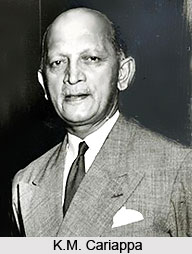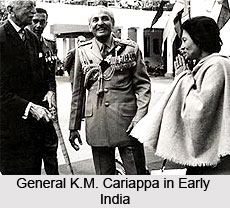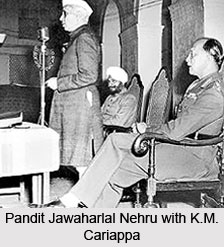 Kodandera Madappa Cariappa is a legendary name in Indian Army; he was the first and one of the few to have ever occupied the prestigious chair of Field Marshal in armed forces ranking. From an early childhood, after losing his parents, Cariappa was engrossed to make it big in the army and become a jawan. He was a dedicated student in school and under British administration he had surprisingly excelled in every task he performed, earning admiration wherever he went. As a starting milestone, Cariappa made himself selected as a Commissioned officer under British officers, overlooking several hurdles. With strict perseverance, belief and duty towards his Almighty and British high-rankers, Cariappa slowly and subtly started to move up the Army ranks, performing each duty with pain and care. His choice of missions under severe circumstances and extreme turbulence made everyone wonder about his prowess and to how much he could stretch his limits. Quite obviously, he was promoted after regular intervals and he can be termed as one of the few unusual Indian beings, who maintained a stable rapport with both natives and Britishers. With the historical event of India becoming free from British yoke, Cariappa was commissioned in the newly created Indian Army, which further ushered in a series of eventful sagas, leading to his becoming the top-ranker.
Kodandera Madappa Cariappa is a legendary name in Indian Army; he was the first and one of the few to have ever occupied the prestigious chair of Field Marshal in armed forces ranking. From an early childhood, after losing his parents, Cariappa was engrossed to make it big in the army and become a jawan. He was a dedicated student in school and under British administration he had surprisingly excelled in every task he performed, earning admiration wherever he went. As a starting milestone, Cariappa made himself selected as a Commissioned officer under British officers, overlooking several hurdles. With strict perseverance, belief and duty towards his Almighty and British high-rankers, Cariappa slowly and subtly started to move up the Army ranks, performing each duty with pain and care. His choice of missions under severe circumstances and extreme turbulence made everyone wonder about his prowess and to how much he could stretch his limits. Quite obviously, he was promoted after regular intervals and he can be termed as one of the few unusual Indian beings, who maintained a stable rapport with both natives and Britishers. With the historical event of India becoming free from British yoke, Cariappa was commissioned in the newly created Indian Army, which further ushered in a series of eventful sagas, leading to his becoming the top-ranker.
On 15th August 1947, India`s Independence Day, K.M. Cariappa wore the insignia of a Major General and occupied his chair as the Deputy Chief of General Staff (Dy CGS) at the Army Headquarters. British Indian Army was wrapped up and Indian Army had finally taken a fresh look. A week earlier, the General Headquarters had once again been re-named as Army Headquarters.
On this great day, soon after the throng of well-wishers left his room, Cariappa felt sad and missed his erstwhile compatriots. The remaining Pakistani officers were to leave India by December 1947. Cariappa also prayed to Goddess Kaveri for the millions of innocent people who had been caught in the whirlwind of communal carnage. Then he informed his father in Madikeri and other friends living in U.K. The dawn of freedom meant so many things to him as he saw the huge responsibilities lying ahead of him. K.M. Cariappa in Indian Army was now to assume responsibilities to take the task further and make it known as a new wing to the world.
As Indian Army Officers were gradually replacing the British, Cariappa heard about his next promotion to the rank of Lieutenant General. He was in England, attending the Commonwealth Conference. On his return, Cariappa relieved Lt. General Sir Francis Tuker at the Eastern Command, Ranchi in November 1947. But within six weeks, he was called back to Delhi as conditions began deteriorating on the Western Border. The remaining Pakistani officers were to leave India by December 1947.
As early as October 1947, Pakistan had started its hostile activities by providing covert logistic support to the tribals. Besides, its regular soldiers were given long leave to fight as `deserters` and lead the tribals clandestinely. Since Pakistan had launched the offensive, it had all the tactical advantage in choosing the terrain for infiltration beforehand. Its lines of communication were shorter and more secure. On the other hand, India had numerous logistical problems. The mountainous region posed serious difficulties in transporting the medium guns of the artillery. Its wireless messages were often intercepted while the telephone lines were not reliable. The fighting units were strung over hundreds of kilometres far from each other and Delhi was far away from the scene of action. Cariappa`s suspicions that some Britishers were leaking army secrets turned out to be true. A peculiar situation developed as the same set of Britishers, after the Partition, was fighting against each other now. Under these circumstances, Cariappa, leading from the forefront in Indian Army, kept his plans secret from his superior British officer, the C-in-C (Commander-in-Chief), General Roy Bucher. He moved his headquarters to a place near Jammu. Furthermore, he intended to be near his troops.
In the intense war that ensued between the two newly-created countries, the Indian Forces fought valiantly and recaptured many strategic places. During this fierce operation, the list of martyrs and gallantry awards went on increasing and Cariappa kept moving from one post to the other, unmindful of the hail of bullets. Indian Army perhaps never had found such a valiant officer, fearless in the face of pellets. Cariappa truly proved his position and stance, awarded each time by the armed forces organisation.

Knowing the nature of Pathan tribals very well, Cariappa even appealed to their conscience to live and not die for a cause which was not theirs. But this, time, it seems there was little effect on them. As winter set in, the road from Jammu to Srinagar was also blocked by snow, near Bannihal at the higher altitudes.
The Royal Indian Air Force (RIAF) provided close support for the ground forces and struck heavily on Pakistani targets. Some Dakotas, in addition to their normal function of transporting men and material, were modified so as to drop bombs. However, Cariappa`s problems increased by mid-1948. Ladakh had to be defended at all costs and he looked at Zoji La, Kargil, Leh, Skardu with great concern. Here, Cariappa, who knew his history well, decided to repeat the performance of Maharaja Ranjit Singh`s bold commander Zorawar Singh, who had swept through Ladakh and reached Baltistan through Western Tibet. A battalion crossed the 17,470 ft. Umasi La, romped into Zanskar valley and carried out their operations successfully. The people of Ladakh considered Cariappa as their saviour.
In the annals of military operations, 24th May 1948 was a red-letter day for the RIAF when Air Commodore Mehar Singh DSO, the legendary hawk of the Burma Operations, made history by landing his two-engine Dakota aircraft at Leh airstrip at an altitude of 11,000 feet under very trying conditions. The VIPs on board were none other than the Deputy Chief of the General Staff, Lieutenant General Cariappa and Major General Thimayya. This transport aircraft, though extremely versatile, lacked adequate heating, pressurisation and de-icing facilities. To fly at nearly 25,000 feet over the Western Himalayas, Mehar Singh was careful enough to keep extra oxygen-masks for the VIPS, but Cariappa refused to use it despite hard-breathing.
Their arrival had earlier been radioed and a huge crowd of Ladakhis led by their Head Lama Kushak Bakula greeted Cariappa as they saw the awe-inspiring sight of the messenger from the skies. As Mehar Singh kept the engines running, Cariappa re-assured the people and returned safely by the same aircraft. K.M. Cariappa by this very courteous move had just elevated his position even higher, both practically as well as allegorically. Cariappa`s career in Indian Army had to go through such several perilous issues, which he passed with ease, making him reach such a prestigious position as Field Marshal.
While the month of May brought some good tidings from the front-lines, the next month of June turned out to be a month of some wrong political decisions later leading to much slippery moves. Aware of the acutely demoralising effect on the soldiers, Cariappa channelled his protest through General Roy Bucher to Pandit Jawaharlal Nehru. But he was advised to restrain himself. Thimayya and other senior officers exerted pressure on Cariappa to resign. But Cariappa did not waver in his resolve to do what was best for the country and began going around personally inspecting and visiting various forward positions in order to re-instill a spirit of high morale among his soldiers. Apparently, Cariappa had the foresight to visualise the dangerous chain-reaction that was bound to shatter the morale of his battle-weary men in case he yielded to the mental pressure being exerted on him. The consequences would have been catastrophic.
A commander is supposed to remain cool despite provocation and Cariappa had that enormous capacity to face such an acid test. Perhaps, this was one of the most important incidents of Cariappa`s life while serving in Indian Army, which elevated him to a much higher pedestal than others.
By merely contemplating the explosive situation of the country in retrospect, one can easily fathom what a blessing it was to have such a towering military leader who could deliver the goods for the nation with such success. Even after his retirement, when Cariappa visited jawans in the Amritsar/Lahore sector, soon after the 1965 war, the Pakistani soldiers shouted from the other side of the no-man`s land that General Cariappa should come over to their side and honour them as well. The `Grand Old Man` of the Indian Army was only too glad to move over to their positions and enquired about their welfare. Field Marshal Ayub Khan thanked Cariappa for this kind gesture. On the outside, Cariappa was all steel but inside, he was ready to melt at the slightest human warmth.
In course of the 1965 War with Pakistan, a ceasefire came into existence finally. The ground positions held by the two opposing forces came to be called the Line of Control (LoC). This was also the time when the British C-in-C (Commander-in-Chief) in India handed over the charge to General Cariappa, who had been promoted once more in the freshly-formed Indian Army.

The day that dawned on 15th January 1949 fulfilled Cariappa`s cherished desire to command the Army which he had so painstakingly nurtured. No doubt, he had fully deserved it. Congratulations began pouring in from everywhere and the event turned his New Delhi residence into a magnificent `mela`, where a medley of people from all walks of life had descended to see their hero.
However, Cariappa`s joy was tinged with sorrow. The frenzy of hatred resulting in unnecessary bloodshed had hardly been contained while the gigantic task entrusted to the Army for transporting and rehabilitation of more than ten lakhs of refugees now faced him. Cariappa had set up a military evacuation organisation for this purpose. All this time, Cariappa reminded himself of his father`s words that there was a big task before him now. Every significant point in his job was taken up as a milestone by Cariappa while his extensive hold in Indian Army. Fearing nothing and moving forward with the courage of a tiger, Cariappa was a braveheart personified.




















